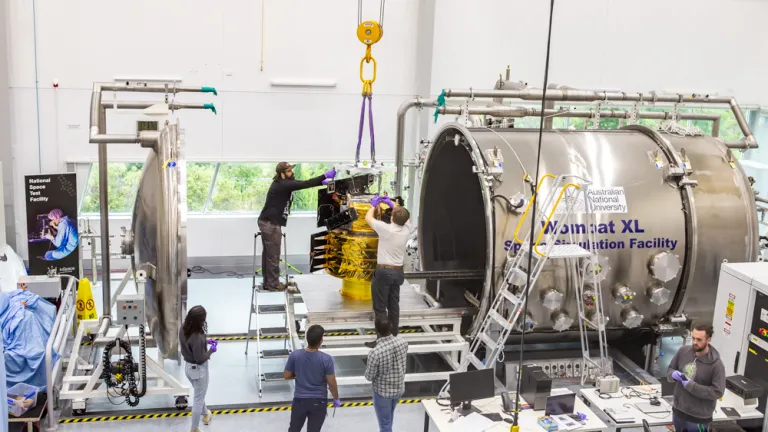
PhD
Overview
Since the 1950s, the Research School of Astronomy and Astrophysics (RSAA), Mount Stromlo Obervatory (MSO), has an outstanding, successful Doctor of Philosophy (PhD) program. RSAA currently has more than 50 PhD students, with over one third of them international students. Stromlo graduates can be found in many of the world's major astronomical centres.
The PhD program offers students access to state-of-the-art optical, infra-red, radio, instrumentational, and computational facilities, and draws on the expertise of around 50 RSAA astronomers and instrument scientists, as well as collaborators from around the world.
The main research areas at RSAA include:
- Cosmology
- Extra-solar planets
- Formation and evolution of galaxies
- Galactic structure and stellar populations
- High-energy astrophysics (supernovae and gamma-ray bursts)
- Interstellar medium and star formation
- Instrumentation
- Stellar atmospheres and evolution
Theoretical work is currently being done in the fields of plasma and high energy astrophysics, stellar atmospheres, stellar and galactic evolution, galactic dynamics, N-body simulations, star formation, and computational fluid dynamics. We also offer PhD topics in astronomical instrumentation associated with optical and infrared telescopes. RSAA is leading Australia's involvement in GMT and ESO, and in developing world-leading instrumentation.
RSAA operates the ANU 2.3m telescope at Siding Spring Observatory, which is equipped with instrumentation for low- and high-resolution spectroscopy, and faint object imaging from near ultraviolet to infra-red wavelengths. The 1.3m SkyMapper telescope has been constructed at Siding Spring Observatory and is currently conducting an automated all-sky imaging survey of the southern sky similar to SDSS.
Students at RSAA also have access to the 3.9m Anglo-Australian Telescope (AAT), the Parkes Radio Telescope, and the Australia Telescope Compact Array (ATCA) operated by CSIRO, in addition to international facilities such as the European Southern Observatory (ESO), the Gemini Observatory and Magellan telescopes. Powerful computing facilities are available for data acquisition and analysis, and theoretical model building, through the National Computational Infrastructure (NCI) and the Pawsey Supercomputing Centre.
Key facts
- Study with internationally-renowned astronomers and instrument scientists
- Many of our graduating students have been awarded prestigious fellowships including Fulbright, Zonta, Hubble, CfA, Carnegie, ESO, Magellan, CITA, Oort, and Jansky Fellowships.
Careers
The PhD program provides excellent training for a career in many fields involving critical thinking, problem solving skills, data analysis, and computing. Foremost, it is a preparation for research work in the discipline of astronomy itself. Many of the program's graduates proceed to postdoctoral positions (usually overseas), which broadens their range of research experience. This also forms the basis for obtaining a more permanent position, either at an observatory where the work is entirely research based, or at a University with the traditional mix of research and teaching responsibilities.
The technological expertise acquired in the program is very marketable in other careers as well. A training in image processing, in instrument and computer applications, and in high-level problem solving, is widely applicable and highly valued in business and industry. Graduates of the program are found in meteorology, computer management, the chemical industry, business consultancy, banking and finance, and secondary school teaching.
Learning experience
Fees & scholarships
Scholarships
International student applications into the RSAA PhD program





